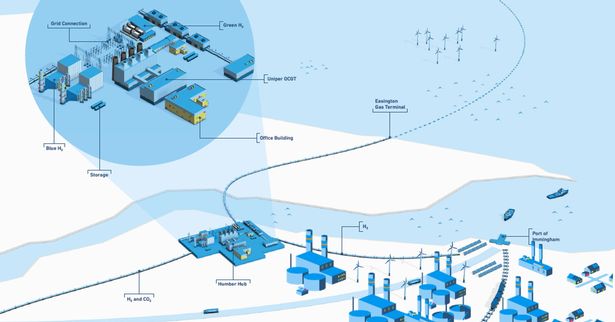
Shell and Uniper have inked an agreement to develop a blue hydrogen production plant at the Killingholme Power Station that would provide low carbon fuel to power plants, industrial sites and transportation companies throughout the Humber region.
The partners said they intend to produce up to 720MW of hydrogen at the proposed site, producing the low carbon fuel by steam reforming fossil gas and using carbon capture and storage (CCS) to prevent the majority of emissions generated during the process from polluting the atmosphere.
The Humber Hub Blue Project could see the capture of approximately 1.6 million metric tonnes of carbon per year through CCS, according to the energy giants, who claimed this could make a significant dent in the UK government's target to have 10Mt of annual CCS capacity built or operational by 2030.
UK country chairman and chief commercial officer at Uniper Mike Lockett said the blue hydrogen plant could play a key role in the broader effort to decarbonise the emissions-intensive Humber region.
"The development of a hydrogen production hub at Killingholme represents a significant step towards decarbonising the UK's largest industrial cluster," he said. "Future proofing the industry, this investment has the potential to secure and grow the region's economy."
Under the plans, carbon captured at the plant would be transported in a pipeline that would shuttle emissions from industrial and power emitters across the region to the offshore Northern Endurance Partnership CO2 storage facility in the North Sea.
Plans for the pipeline are currently being drawn up by the Zero Carbon Humber coalition of companies, which makes up one half of the East Coast Cluster scheme picked out last year by the government as one of two carbon capture and storage cluster projects for priority support.
The Humber Hub Blue project is one of a number of proposed projects within those two priority clusters chosen by the department for Business, Energy and Industrial Strategy (BEIS) last month as eligible for support as part of the second phase of its industrial decarbonisation support programme.
Shell and Uniper said they now plan to collaborate on process design studies and site development activity, with a view to taking the project to front end engineering and design stage by 2023. The government has said it expects all ‘phase two' projects to secure support through its support programme to be operational from 2027, with final investment decisions given from 2024.
Minister for Business, Energy and Clean Growth Greg Hands said the tie-up between Shell and Uniper would help the UK government reach its new aim to deliver 10GW of low carbon hydrogen by 2030, as set out in last week's Energy Security Strategy.
"We've set ambitious targets for hydrogen production in our British Energy Security Strategy and are investing £360m in innovative energy technologies to get us there," he said. "Today's announcement shows real confidence in hydrogen - creating high-quality jobs to level up the Humberside region, based on this clean, cutting-edge new super fuel."
The Humber Hub Blue project is one of a clutch of blue hydrogen projects that have been announced by oil and gas giants in the UK over the last year. BP is planning to build a 1GW site Teesside, Equinor is collaborating with SSE on a 600MW project on the north bank of the Humber, and Ineos has touted plans to build a "world-scale" plant at its oil and gas refinery near Grangemouth, Scotland.
However, blue hydrogen remains contentious among many environmentalists, who have warned that scaling up hydrogen capacity dependent on fossil gas risks keeping the country reliant on fossil fuel infrastructure and exploration for years to come, at precisely the time when emissions need to be rapidly reduced to hit net zero targets. They have also pointed out blue hydrogen plants rely on still-nascent CCS technologies which are unable to capture all CO2 from the process, and could also could prove more expensive in the long run than the technologies needed to produce 'green' - or renewable - hydrogen.
But advocates of blue hydrogen argue it could prove more cost-effective in the short-term than green hydrogen produced using renewable power and electrolysis, while freeing up renewable power to help decarbonise the grid and mitigate some of the job losses and disruption that would otherwise result from the scaling back of the gas industry.
Uniper is simultaneously planning a separate green hydrogen project at its Killingholme site which would produce zero emissions H2 using renewables to power the electrolysis process which splits water into its component elements. The energy firm plans to complete the feasibility study for the project imminently, it said this week.